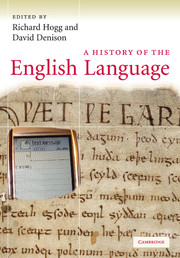7 - English in Britain
Published online by Cambridge University Press: 05 September 2012
Summary
Introduction
We can be certain that, for as long as the English language has been established in Britain, so dialect variation has also existed. If we examine dialect variation in present-day English, even if it is possible to assume that there is a single over-arching speech community which makes up the language which we might, for the lack of a better term and with acknowledgement of the insult thereby perpetrated on the Irish, call ‘British English’, there remains the problem of what we recognise as the dialects of that community. We could simply recognise the individual nations, and talk about English, Scottish, Welsh and Irish dialects. But it takes only a moment to see that that will not do. The speaker from Kent does not see his or her dialect as the same as that of someone from Newcastle, any more than speakers from Aberdeen and Glasgow think that they share a single dialect.
Suppose, however, that we were able to set out a geography of British English dialects which somehow overcame the above points. Dialects are not merely a matter of geography. For dialects vary by much more than geography. Speakers vary in age, gender, social class and, increasingly, ethnicity. So, speakers from the same geographical area must differ from each other because of their age, their gender, and other social variables. All these variations may cause difficulties for the student of present-day English. But for the historian of English they are even worse.
- Type
- Chapter
- Information
- A History of the English Language , pp. 352 - 383Publisher: Cambridge University PressPrint publication year: 2006

